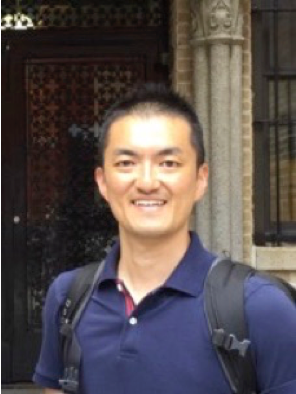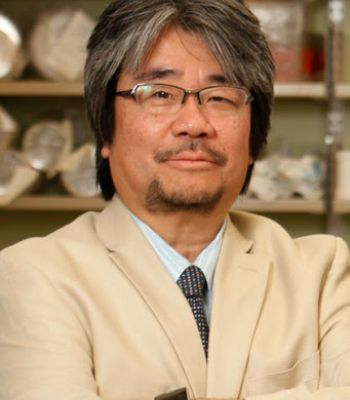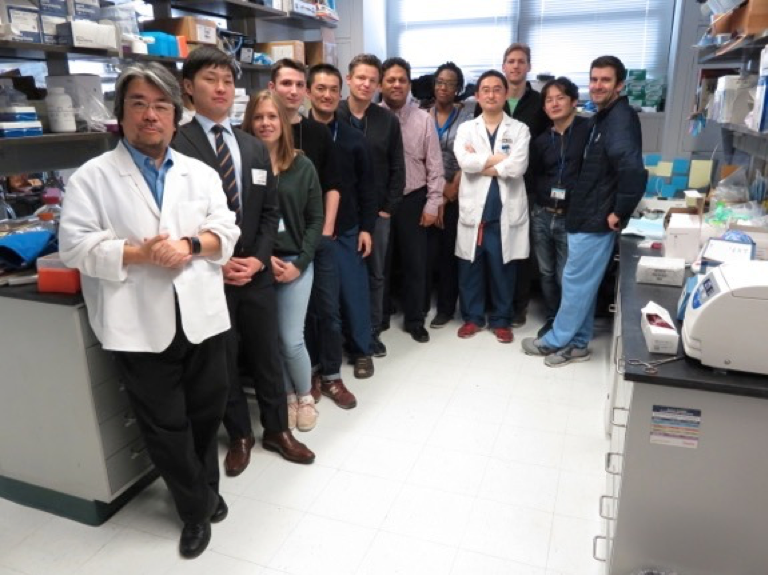The Coronavirus pandemic
Hotspots of COVID-19 infection can now be found world-wide but, there is some hope that the peak has been reached in some hard-hit areas and the tide of illness there may soon recede. Regardless of where we live, however, this is not the time to relax our vigilance because there is still so much that remains unknown about the virus and how it spreads. IXA President Agnes Azimzadeh has written an address to our members concerning the pandemic that can be found on the IXA webpage.
We encourage all of our members who have not yet read the address to do so. It includes links to valuable resources concerning COVID-19. Our journal Xenotransplantation has published a commentary on the possible interspecies transmission of SARS-CoV-2, focusing on the possibility of transmission to pigs. In a time where situations change rapidly, it remains important for our members to keep informed of the most up to date information provided by trusted sources. Stay connected and stay safe!
TTS/IXA 2019 Young Investigator Awardees:
A view to the future.
Ten Young Investigators received awards for their best scored abstract at the last IXA meeting. We reached out to the recipients to interview them about their personal experience in the field of xenotransplantation.Some recipients have been pursuing xenotransplantation for close to a decade or longer while others have only more recently been exposed to the field, but all agreed on its importance and are confident that in the not too distant future, xenotransplantation will be a clinical practice. The enthusiasm and level of commitment that they bring to their work is truly inspiring and we would like to take this opportunity to share with our readers some of their thoughts on participating in IXA2019, their careers, and what they see as the future of xenotransplantation. The perspective of these investigators should be interesting to us all because the generation represented by them and their peers will be the one that will see the clinical promise of xenotransplantation fulfilled. Everyone that we reached out to was pleased and eager to discuss his or her stories with us.









We asked how they became interested in the field of xenotransplantation.
Wenlong Huang (University of Alberta, Canada) credits a 2013 visit from Dr. Gina Rayat to Shantou University in China to starting him on his path in xenotransplantation. Chang Ho Yoon (Seoul National University Hospital, South Korea) has been a PhD student under Professor Mee Kum Kim for 3 years researching corneal xenotransplantation. Takayuki Yamamoto (University of Alabama at Birmingham, USA) spoke of his 17-year relationship with Professor Takaaki Kobayashi, a former IXA President, in helping to form his path and providing the opportunity to continue his studies with Dr. David Cooper, another former IXA President. Abdulkadir Isidan (Indiana University, USA) and Angela Chen (Indiana University, USA) were both only introduced to xenotransplantation relatively recently by their mentor Dr. Burcin Ekser, while Raza Ali Naqvi (Indiana University, USA), also a member of the Ekser lab, became involved in the field in 2013 due to the kind efforts of Dr. Bernhard Hering. Prof. Wei Wang brought Xiaoqian Ma (Third Hospital of Central South University, Peoples republic of China) to the study of xenotransplantation giving her early career a direction about 10 years ago, which she then more recently followed with Drs. Wayne Hawthorne and Philip O’Connell at the Centre for Transplant and Renal Research in Sydney. Yuichi Ariyoshi (Columbia University Medical Center, USA) became interested in xenotransplantation by reading an article published by Dr. Kazuhiko Yamada before joining his lab at Columbia several years later, while Kazuhiro Takeuchi (Columbia University Medical Center, USA) was encouraged by his mentor to join the Yamada lab around the same time.
The success of our award recipients shines a light on the crucial roles of their mentors in introducing them to the study of xenotransplantation, encouraging them, and providing support and friendship that allows them to grow and flourish in their careers and lives. We should all remember the value of these relationships not only to our students but to mentors as well.
What were their thoughts on receiving the TTS-IXA Scientific Congress Awards during IXA2019 Munich?
The Award Recipients were honored and humbled to see that the xenotransplantation community respected their hard work and dedication. This was actually the second time that Wenlong was so honored (as he also received recognition in Baltimore, 2017). The Young Investigators were unanimous to point out that their recognition was actually directed to the Investigators and Lab groups that surround each of them, working together towards common goals. Receiving the award also inspires and motivates them to further investigations. Of course, receiving an award is a memorable experience but the IXA Congress provided many other opportunities as well.
For Yuichi, a key experience, also mentioned by others, was the opportunity to interact with eminent researchers that had contributed so much to their specialties. Kadir said that IXA2019 was important to him as his first international academic meeting and he was particularly excited to meet and discuss his studies with Professor Mee Kum Kim. He also bonded with Chang Ho over their mutual interest in corneal xenotransplantation. Wenlong commented on the pleasure when someone would approach them with questions or to share insights after presenting a poster or a talk. Both Chang Ho and Angela (and surely others as well) enjoyed the festive Congress Dinner at Hofbräuhaus and especially the live music, while Angela also mentioned opportunities for trainees such as the Young Investigator Committee. Takayuki and Xiaoqian both appreciated the wonderful experiences in meeting with fellow young researchers in both formal and informal settings. Kazuhiko found the whole adventure immensely rewarding as he gained valuable experience presenting at the international Congress.
We asked where they saw themselves and the field of xenotransplantation in 10 years.
Our respondents looked into their crystal balls to see a bright future for xenotransplantation (including advancements in GE pigs and immunosuppression) and rewarding career paths for themselves.
Wenlong envisions his career as a clinical doctor and researcher with interest in xenotransplantation. Chang Ho looks to continue the cornea research of his group, possibly by incorporating GE pigs. Takayuki wants to follow in the footsteps of Dr. Cooper as an academic surgeon, responsible for clinical organ allotransplantation as well as xenotransplantation research. He believes that pig kidney and heart transplantation will be established in the next decade. Kadir sees xenotransplantation as a continuation of the cycle of organ allotransplantation from dream to reality but he is not sure yet where his own path will take him. Angela aspires to be an abdominal transplant surgeon, hopefully working on xenotransplantation clinical trials. Raza sees his work in the field of pig islet xenotransplantation, utilizing his expertise in gene engineering to make “better” islets.
Xiaoqian believes that xenotransplantation will be an alternative treatment for many patients with end-stage organ failure and hopes to run a lab doing clinical porcine islet transplantation. Kazuhiro wants to continue research in pathology regarding kidney transplantation and he believes that kidney xenotransplantation, including the tolerance strategy that he is working on in Columbia will be successful. Yuichi feels that by incorporating gene modification and overcoming immunologic issues, islet and/or kidney xenotransplantation will undergo clinical trials in the US within 5-10 years and he hopes to perform clinical kidney xenotransplantation in Japan.
While it may be difficult for some of us to think back to our own early experiences or our first presentation at an international meeting, it is refreshing to get to know our younger members and the perspectives that they have. The IXA is truly an international association with members from all over the world. Talented investigators can and do seek out positions and mentors to guide them from around the globe. The awardees’ mentors, David Cooper, Burcin Ekser, Wayne Hawthorne, Bernhard Hering, Mee Kum Kim, Takaaki Kobayashi, Phillip O’Connell, Gina Rayat, Wei Wang, and Kazuhiko Yamada as well as many other experienced and well-respected scientists and physicians, give back each year to the field by helping to mold the next generation of leaders. The advice that we would offer to all of our young investigators is to keep working hard, pushing the boundaries of our knowledge, and to remember that the IXA offers a community of support and resources for you.
Xeno-Prize
The Xeno Prize is awarded to the first author of the best paper published in the journal Xenotransplantation each calendar year. This prize of US $7,000 is jointly sponsored by the International Xenotransplantation Association (IXA) and the publisher of Xenotransplantation (Wiley).
We would like to take this opportunity to encourage our readers to submit their best manuscripts to our official journal, Xenotransplantation. Being published in a journal exclusive to xenotransplantation assures that members of the field will see your work. The 2019 Xeno-Prize will be awarded at the TTS Congress. There is still plenty of time to submit a manuscript to Xenotransplantation to be considered for the 2020 Xeno-Prize!
The 2018 Xeno-Prize was awarded to Dr. Kazuhiko Yamada during the IXA meeting in Munich, for his article entitled GalT-KO pig lungs are highly susceptible to acute vascular rejection in baboons, which may be mitigated by transgenic expression of hCD47 on porcine blood vessels”
The article discusses the advances in pig to baboon lung xenotransplantation at Dr. Yamada’s lab at the Columbia Center for Translational Immunology and highlights the importance of developing the optimal genetic make-up of donor pigs for xenotransplantation of not only lungs but also other organs. We reached out to Dr. Yamada and he was gracious enough to provide a summary of his article and some of the work that is being done at his lab, which should be of interest to many of our fellow members of the IXA.
GalT-KO pig lungs are highly susceptible to acute vascular rejection in baboons, which may be mitigated by transgenic expression of hCD47 on porcine blood vessels.
Organ shortage is a major obstacle in clinical transplantation. Recent progress in xenotransplantation (XTx) increases the likelihood that XTx may provide a practical means for overcoming this obstacle. Studies involving the kidney and heart transplant of life-supporting solid organ xenografts in pig-to-baboon models have shown graft survival >6 months and >2 years respectively. Despite this progress, the success of porcine lung grafts in baboons remains frustratingly limited. Even with the utilization of multitransgenic GalKO pigs as donors, the majority of lung xeno grafts are rejected within 2-4 days. In our article, we reported our initial results of pig-to-baboon lung xenotransplantation. We demonstrated lung graft survival in 3 of nine of the studied baboons under a survival protocol which maintained aerated grafts for >7, 9 and 10 days respectively. The most notable finding is that in all lung grafts that survived >7 days, hCD47 expression was detected on the vascular endothelial cells (ECs) in all grafts. In contrast, the grafts that did not express hCD47 on vascular ECs were uniformly rejected with diffuse hemorrhagic changes noted within 7 days despite the host baboons having low levels of non-Gal preformed anti-pig natural antibody (Nab) cytotoxicity.
To our knowledge, our report is the first evidence of histologically viable porcine lung grafts beyond 7 days in baboons. Our data suggest a mechanism in which there is destruction of the fragile structure of alveolar capillary endothelium by preformed Nab. This destruction, even at low antibody levels, combined with macrophage activation and/or phagocytosis of endothelial cells caused by CD47-SIRPα incompatibility likely lead to diffuse hemorrhage in the grafts. The transgenic expression of hCD47 on ECs of donor lungs mitigates acute humoral rejection.
However, this destruction was not totally avoided. Our sequential report demonstrated (reported separately) that by combining our intrabone-bone marrow transplant strategy with hCD47+ pig lung grafts, survival was prolonged for up to 14 days. Although the development of multi-transgenic pigs as xeno donors has recently proven to be a major advancement in the field of xenotransplant, it remains important to determine which gene(s) are essential to add and where they should be expressed. We continue to make efforts on developing breakthrough strategies to overcome this challenging hurdle to make lung xenotransplantation a clinically applicable option.
Yamada Lab at Columbia University: Dr. Kazuhiko Yamada is Professor of Surgery, Surgical Sciences at Columbia University, and Director of Surgical Research at the Columbia Center for Translational Immunology (CCTI). Dr. Yamada has developed innovative strategies to the induction of tolerance across xenogeneic barriers. His major breakthroughs in the field include vascularized thymic transplantation (VT-Tx), as well as intrabone-bone marrow transplantation (IBBM-Tx). He has achieved greater than 6 months survival of life-supporting kidney xenografts that were co-transplanted with VT grafts in baboons with pig specific unresponsiveness demonstrated in baboons. Dr. Yamada’s lab has several projects that are aimed to induce tolerance across both allogeneic and xenogeneic barriers using large animals. His research projects have been supported by NIH grants as well as other research foundation support.

New IXA Fundraising Projects
The IXA Council executive Team have listened to what their members want and are taking action. Our members asked for more initiatives to fund investigations or travel expenses, especially to provide opportunities for Young Investigators. In response to our member’s recommendations, the IXA is establishing a fund-raising program for this purpose. A Young Investigators Endowment Research Fund (YIER) will be created to support the education, research and mentorship of the next generation of professionals in Xenotransplantation. The funds raised will support a variety of initiatives, such as travel awards and laboratory exchange programs to broaden the research experience of scholars. This fund will rely on your generous donations. Additional awards and fund-raising initiatives are discussed by the IXA Council.
Top ten most downloaded articles from Xenotransplantation in 2019
The Xenotransplantation Journal is striving to provide an up-to-date and high impact platform for the publication of scientific work related to xenotransplantation, reaching and serving a broader scientific community. The top 10 articles downloaded in 2019 are listed together with a link to the Journal page.
| Title | Link | Volume Details | Number of Downloads | |
|---|---|---|---|---|
| 1.Xenotransplantation in China: Present status | https://doi.org/10.1111/xen.12490 | Volume 26, Issue 1 January/February 2019 | 1,296 | |
| 2.Xenotransplantation—theological–ethical considerations in an interdisciplinary symposium | https://doi.org/10.1111/xen.12163 | Volume 22, Issue 3 May/June 2015 | 1250 | |
| 3. Progress in multiple genetically modified minipigs for xenotransplantation in China | https://doi.org/10.1111/xen.12492 | Volume 26, Issue 1 January/February 2019 | 970 | |
| 4. Viable pigs after simultaneous inactivation of porcine MHC class I and three xenoreactive antigen genes GGTA1, CMAH and B4GALNT2 | https://doi.org/10.1111/xen.12560 | Volume 27, Issue 1, January/February 2020 | 904 | |
| 5. IXA 2019‐ Abstracts of the 15th Congress of the International Xenotransplantation Association, Munich, Germany | https://doi.org/10.1111/xen.12553 | Volume 26, Issue 5 September/October 2019 | 833 | |
| 6. Porcine signal regulatory protein alpha binds to human CD47 to inhibit phagocytosis: Implications for human hematopoietic stem cell transplantation into severe combined immunodeficient pigs | https://doi.org/10.1111/xen.12466 | Volume 26, Issue 2 March/April 2019 | 762 | |
| 7. Current status of xenotransplantation in South Korea | https://doi.org/10.1111/xen.12488 | Volume 26, Issue 1 January/February 2019 | 709 | |
| 8. Different approaches to heart valve decellularization: A comprehensive overview of the past 30 years | https://doi.org/10.1111/xen.12354 | Volume 25, Issue 1 January/February 2018 | 694 | |
| 9. Evaluation of human and non‐human primate antibody binding to pig cells lacking GGTA1/CMAH/β4GalNT2 genes | https://doi.org/10.1111/xen.12161 | Volume 22, Issue 3 May/June 2015 | 649 | |
| 10. IXA 2017‐ Abstracts of the 14th Congress of the International Xenotransplantation Association, Baltimore, USA | https://doi.org/10.1111/xen.12328 | Volume 24, Issue 5 September/October 2017 | 633 |
TTS 2020 Registration
The Abstract Presenter registration deadline is June 15. The Early-Bird registration deadline is July 10. Follow this link to register.
Because of the ongoing COVID-19 pandemic, please, check updates on the meeting at https://tts2020.org/
Social
Address
International Xenotransplantation Association
C/O The Transplantation Society
International Headquarters
740 Notre-Dame Ouest
Suite 1245
Montréal, QC, H3C 3X6
Canada


